SSDI Lawsuits & Long-Term Disability: Ensuring Financial Security
- Last Updated: July 14th, 2025

Attorney Jessica Paluch-Hoerman, founder of TruLaw, has over 28 years of experience as a personal injury and mass tort attorney, and previously worked as an international tax attorney at Deloitte. Jessie collaborates with attorneys nationwide — enabling her to share reliable, up-to-date legal information with our readers.
Legally Reviewed
This article has been written and reviewed for legal accuracy and clarity by the team of writers and legal experts at TruLaw and is as accurate as possible. This content should not be taken as legal advice from an attorney. If you would like to learn more about our owner and experienced injury lawyer, Jessie Paluch, you can do so here.
Fact-Checked
TruLaw does everything possible to make sure the information in this article is up to date and accurate. If you need specific legal advice about your case, contact us by using the chat on the bottom of this page. This article should not be taken as advice from an attorney.
Key takeaways:
- Receiving benefits from an SSDI lawsuit can provide a lifeline to financial stability.
- SSDI claim not only assures coverage under Title II but also guarantees insured status, providing much-needed compensation and entitlement to health benefits.
- There are numerous cases that stand as a testament to clients achieving financial security
SSDI Lawsuits and Long-Term Disability: Ensuring Financial Security
On this page, we’ll discuss an overview of SSDI Lawsuits, how long-term disability applies to SSDI lawsuits, who qualifies to file an SSDI Lawsuit, and much more.
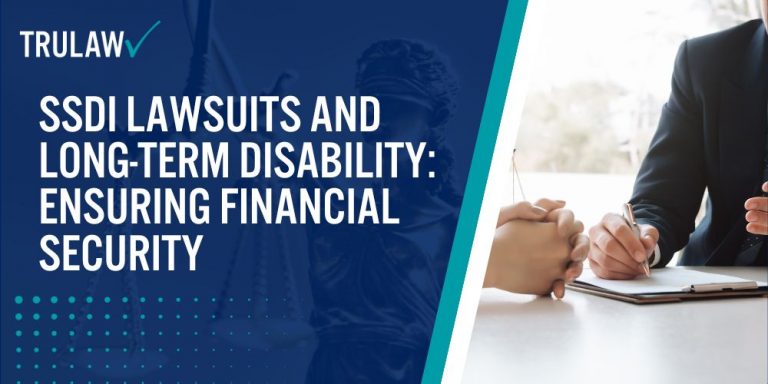
Intro to SSDI Lawsuits
Navigating the complex world of Social Security Disability Insurance – SSDI lawsuits can be daunting.
These legal battles play a pivotal role in securing financial stability for disabled people, especially those with long-term disabilities.
A successful SSDI claim not only assures coverage under Title II but also guarantees insured status, providing much-needed compensation and entitlement to health benefits.
However, unsuccessful or unfiled lawsuits can lead to dire consequences, leaving individuals without the necessary provision for their healthcare needs and overall well-being.
As we delve into this topic, we’ll explore how these lawsuits impact financial security and the potential repercussions of unsuccessful claims in federal courts.
Table of Contents
The Link Between Long-Term Disability and SSDI Lawsuits
Correlation Between Long-Term Disability and Eligibility for SSDI Lawsuits
Long-term disability (LTD) is often a precursor to Social Security Disability Insurance (SSDI) lawsuits.
People with LTD are usually eligible to file an SSDI lawsuit if they can’t work due to their disability.
SSDI is a federal program designed to help people who have worked enough years, paid Social Security taxes but now can’t work due to a severe medical condition.
LTD, on the other hand, refers to a condition that affects your ability to perform your regular job duties for an extended period.
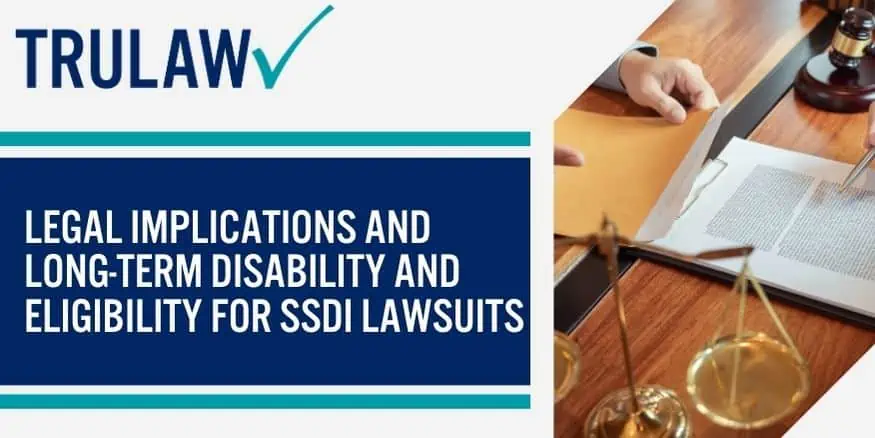
The relationship between these two is quite direct – if you’ve been denied SSDI benefits despite having an LTD, you might be eligible for an SSDI lawsuit.
How Long-Term Disability Can Lead To An SSDI Lawsuits
When it comes down to brass tacks, having long-term disability can lead straight into the courtroom.
If your application for SSDI benefits gets denied despite evidence of your LTD, you may need legal action.
Here’s how SSDI typically goes:
- You apply for SSDI benefits after being diagnosed with an LTD from medical professional.
- The Social Security Administration (SSA) denies your claim.
- You appeal the decision within 60 days for initial claims with substantial evidence.
- If SSA still denied benefits your claim after reconsideration or hearing before an administrative law judge (ALJ), you may then file a lawsuit in federal court against SSA.
It’s not as easy as pie but knowing the process helps navigate these murky waters better.
Legal Implications Of Having A Long-Term Disability In An SSDI Lawsuit
Having long-term disability carries weight in an SSDI lawsuit. It’s like holding a royal flush in poker – it strengthens your case significantly.
Here are the legal implications included:
- Medical Evidence: Your medical records should clearly indicate your LTD and how it prevents you from working.
- Work History: SSA looks at your ability to work. If you’ve been working despite your LTD, it could weaken your case.
- Consistency: Any inconsistencies in your claim can be detrimental. Make sure everything adds up – from medical records to testimonies.
Effectiveness Of Using Long-Term Disability As Evidence In SSDI Lawsuits
Using long-term disability as evidence is like hitting the nail on the head.
It’s a potent piece of evidence that can turn the tide in an SSDI lawsuit.
A 2017 study published in the American Journal of Public Health found that over 10,000 people with disabilities were denied SSDI benefits each year despite having compelling evidence of their disability.
This shows how crucial having solid proof of LTD is when going into an SSDI lawsuit.
Securing Your Future: How SSDI Benefits Provide Financial Stability
The Power of SSDI Benefits
Receiving benefits from an SSDI lawsuits can provide a lifeline to financial stability.
This is especially true for individuals who are unable to work due to disabilities and need a steady source of income.
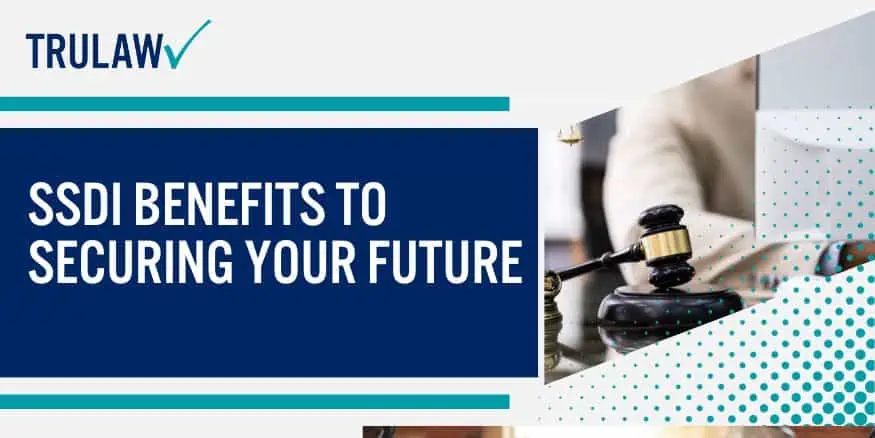
Social security disability insurance (SSDI) benefits can replace employment income, ensuring you still have money coming in.
Supplemental security income (SSI) benefits can also supplement your income, providing additional financial support.
Navigating the SSDI Application Process for Long-Term Disability Cases
Key Steps in Applying for an SSDI Lawsuit
Applying for a Social Security Disability Insurance (SSDI) lawsuit due to a long-term disability claim involves several steps.
First, gather all necessary documents, including medical records that confirm your disability and its impact on your vocational abilities.
Next, fill out the application form provided by the Social Security Administration (SSA).
This can be done online or at one of their local offices. Ensure you follow all guidelines to avoid any computation errors.
Finally, submit your application and await feedback from SSA.
If denied, don’t panic; it’s quite common. You have the right to appeal within 60 days.
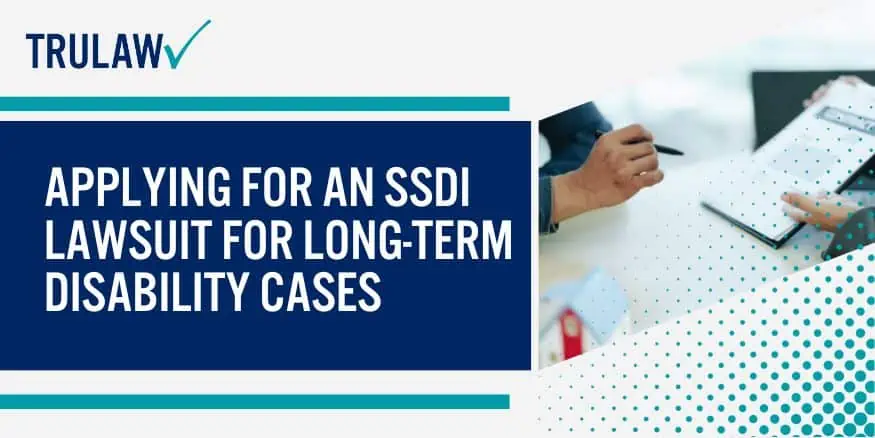
Common Pitfalls during the Application Process
There are many pitfalls you might encounter during this process.
These include incomplete documentation or misunderstanding SSA’s definition of disability.
For instance, SSA only considers disabilities that have lasted or are expected to last at least one year.
Another common pitfall is not following up with treatment after filing your application.
The hearing office will want evidence showing you’re actively managing your condition.
Importance of Accurate Documentation
Accurate documentation is crucial when filing an SSDI lawsuit based on a long-term disability claim.
It serves as proof of your inability to work and therefore justifies your need for benefits.
Medical records should include details about diagnosis, treatment plans and progress reports from healthcare providers.
Also essential are documents showing how the disability affects daily activities and ability to work.
Role Played by Legal Professionals
Legal professionals play an integral role in navigating through SSDI lawsuits based on long-term disability claims.
They understand the complex language used in these processes and can help expedite processing times.
For example, they can assist in gathering necessary documentation or appealing decisions made by hearing offices if needed.
They also provide support throughout waiting periods which can sometimes extend into years due to the backlog in courts.
Remember, while applying for SSDI can be overwhelming, you don’t have to go through it alone.
There are resources available, including legal professionals and human services offices, ready to assist you every step of the way.
Legal Advocacy for Long-Term Disability: The Role of SSDI Attorneys
Why Hire Experienced Disability Attorneys
Engaging an experienced disability attorney is crucial when filing SSDI lawsuits.
They’re well-versed in the complexities of state court proceedings and understand the intricate SSA policy guidelines.
Disability attorneys offer representation that’s grounded in years of dealing with administrative law judges, federal judges, and district court officials.
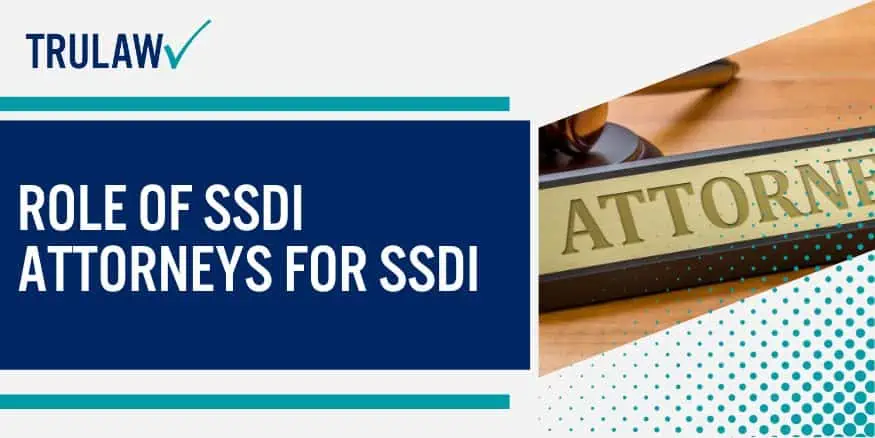
This experience equips them with a unique perspective to navigate the often-confusing legal landscape.
For example, a study by NOLO showed that claimants who were represented by attorneys had a 60% success rate at hearings compared to those without representation.
Appealing Denied Claims: Strategies for Long-Term Disability Applicants
The Appeal Process Unveiled
The journey of appealing a denied SSDI claim is not a walk in the park.
It’s a multi-tiered process, starting with reconsideration, followed by an administrative hearing, appeals council review, and finally federal court litigation.
Reconsideration involves a complete review of your claim by someone who didn’t participate in the initial decision.
If denied again, you can request an administrative hearing before an Administrative Law Judge (ALJ).
Still unsatisfied? You can take your case to the Appeals Council.
Lastly, if all else fails, you can file a lawsuit in federal court.
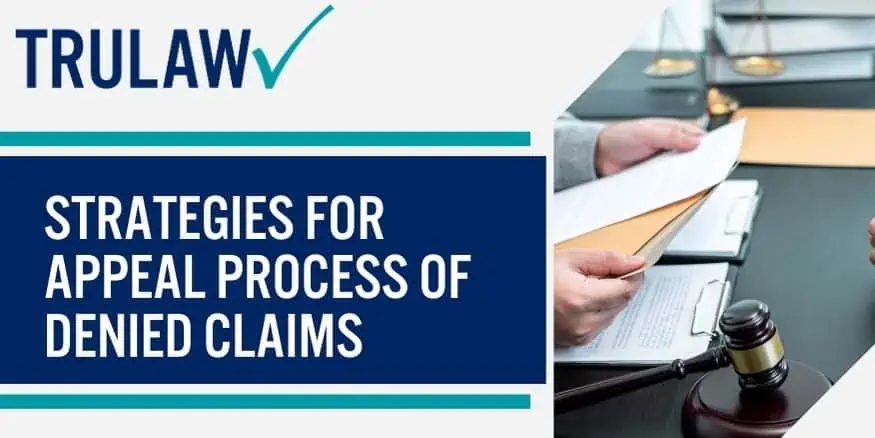
Decoding Denial Reasons
Understanding why your claim was denied is crucial before filing an appeal.
Here are possible common reasons include lack of medical evidence, failure to follow prescribed treatment or meet income restrictions:
- Lack of medical evidence: Your records may not sufficiently prove that your disability prevents you from working.
- Failure to follow treatment: If you’re not following doctor’s orders and it’s affecting your condition, this could be grounds for denial.
- Income restrictions: SSDI has strict income limits; exceeding them could lead to denial.
So before jumping into appeal mode, get clued up on these potential deal-breakers!
The Power of Evidence
Your appeal isn’t just about saying “you got it wrong”.
It’s about presenting new or additional evidence that strengthens your case.
Medical records showcasing progression of disability
Testimonies from treating physicians on severity and limitations
Vocational expert opinions on work-related limitations
These nuggets of information could tip the scales in favor of approval!
Legal Representation Matters
Having legal representation during the appeals process can be game-changing!
Lawyers know how to navigate complex systems like SSDI claims and appeals effectively.
Here are some key things to consider for legal representation in an SSDI case:
- Help you understand the reasons for denial
- Guide you through each step of the appeal process
- Assist in gathering and presenting compelling evidence
In fact, claimants represented by attorneys have higher approval rates compared to those going it alone.
Maximizing SSDI Benefits: Tips for Long-Term Disability Claimants
Ways to Maximize Potential Benefits
Maximizing your disability benefits (SSDI) is no easy feat.
It needs strategic planning and a thorough understanding of the system.
Understand the definition of “gainful activity”.
The Social Security Administration (SSA) uses this term to determine if you’re eligible for benefits.
If you’re engaging in gainful activity, it means you’re earning more than a certain limit, and SSA might deny your claim.
Be aware of work deductions. SSA may deduct certain expenses from your earnings when determining whether they exceed the limit for gainful activity.
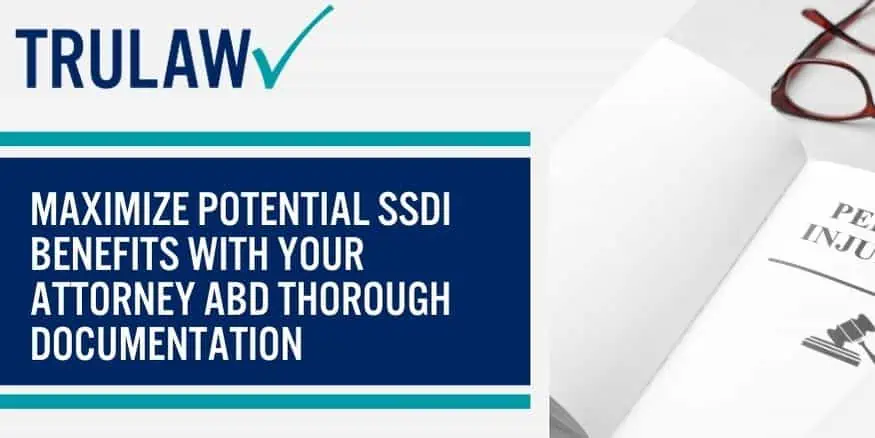
Know about “black lung benefits”.
These are additional benefits provided to coal miners suffering from black lung disease.
Regular Follow-Ups with Medical Professionals
Regular follow-ups with your medical professionals are crucial in supporting your SSDI claim.
They can provide updated medical records that reflect the current state of your disability.
Their professional opinions can be instrumental in convincing SSA about the severity of your condition.
Importance of Thorough Documentation
Proper documentation is key to maximizing SSDI benefits.
Keep track of all doctor’s visits, hospital stays, medications taken, and any changes in health status.
Maintain records of work history and income levels before and after becoming disabled.
Ongoing Communication with Your Attorney
Staying in constant touch with an attorney specializing in SSDI lawsuits can significantly increase the chances of a successful claim.
They can guide you through complex legal processes involved in filing an SSDI lawsuit.
An attorney can help ensure that all necessary paperwork is submitted within time limitations set by SSA.
Understanding the Impact of Long-Term Disability on SSDI Eligibility
Long-term disability can significantly affect eligibility for Social Security Disability Insurance –SSDI lawsuits.
The legal definitions and standards that determine long-term disability are crucial to understand.
Determining Long-Term Disability
The law has specific criteria to define a disability as long-term.
It’s not just about how severe your condition is but also how it impacts your ability to work.
If you’re unable to perform any substantial gainful activity due to a medical condition, you might be considered disabled.
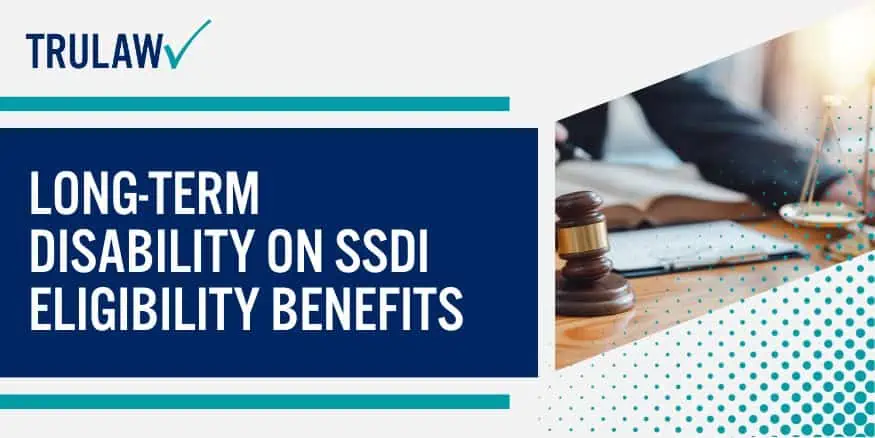
Your disability must have lasted or be expected to last at least one year or result in death.
These conditions form the basis for determining if an individual qualifies for SSDI benefits.
Implications of Long-Term Disability on Benefits
Having a long-term disability influences both the amount and duration of benefits received.
The longer you’ve been disabled, the higher your chances of receiving more extensive benefits.
However, these benefits could reduce over time if there’s improvement in your health condition.
This makes it essential for individuals with disabilities to regularly update their status with the Social Security Administration (SSA).
Legal Definitions and Standards Influencing Eligibility
Legal definitions and standards play a significant role in determining eligibility for SSDI lawsuits.
Here are the SSA uses a five-step sequential evaluation process to decide whether an individual is disabled:
- Determine if an individual is working
- Assess the severity of the medical condition
- Check if the condition meets or equals one from SSA’s list of disabling conditions
- Evaluate an individual’s ability to do past work
- Consider age, education, and work experience
If you meet all these steps’ requirements, then you’re likely eligible for SSDI benefits.
Long-Term Disability Laws and SSDI: A Legal Overview
Basic Principles Governing SSDI Lawsuits
Social Security Disability Insurance (SSDI) lawsuits, a subset of administrative law, are governed by basic principles that ensure fair representation for claimants.
These principles guide the judicial review process, establishing standards for proof and evidence.
The burden of proof lies with the claimant.
Medical evidence is paramount in these cases.
Testimonies from vocational experts may be considered.
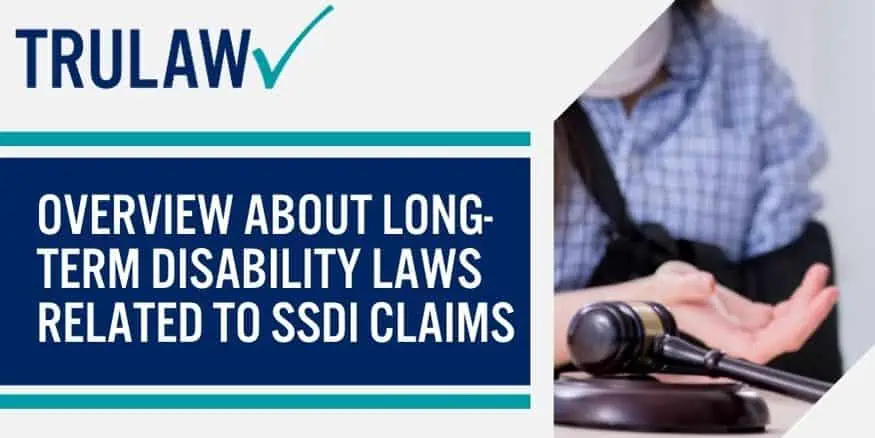
State Vs Federal Regulations on SSDI Cases
There’s a divide between state and federal regulations.
While both levels of government have a say in the matter, federal laws generally take precedence.
Landmark Rulings Impacting SSDI Law
Recent years have seen significant changes in this area of law with landmark rulings shaping policy.
For instance, the 2017 ruling on Biestek v. Berryhill highlighted the importance of vocational expert testimony in disability determinations.
Here are the key points included:
- Vocational expert testimony is not always required for denial or approval of claims.
- The Social Security Administration does not need to provide all data used by vocational experts during hearings.
Common Misconceptions about Long-Term Disability Laws
There’s plenty of misinformation floating around about long-term disability laws and their impact on SSDI claims.
One common misconception is that receiving long-term disability benefits automatically qualifies one for SSDI – this isn’t true!
Here are some facts to set the record straight:
- Long-term disability insurance is often provided by private insurers; SSDI is a government program.
- The criteria for qualifying are different between these two programs.
Client Success Stories: Realizing Financial Security Through SSDI Lawsuits
Achieving Financial Security
In the realm of SSDI lawsuits, there are numerous cases that stand as a testament to clients achieving financial security.
One such story is that of Sullivan, who was able to secure substantial payments following a successful lawsuit.

His case serves as an inspiration for many, demonstrating that it’s possible to navigate through the complex legal process and come out victorious.
Building a Strong Case: Evidence and Documentation for Long-Term Disability SSDI Claims
In the complex world of long-term disability and Social Security Disability Insurance (SSDI) claims, knowledge is power.
Understanding the interplay between these two aspects can significantly influence your financial stability in the face of adversity.
From initiating the application process to appealing denied claims, every step requires meticulous planning and strategic execution, often necessitating expert legal advocacy.
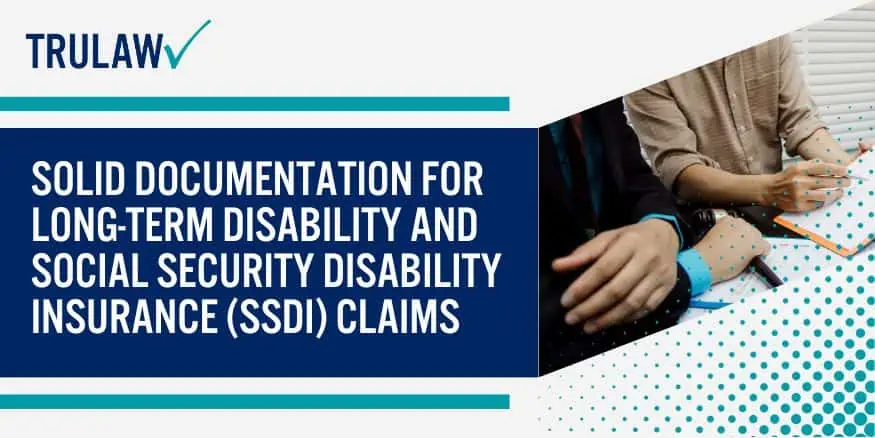
This guide provides a comprehensive overview of the various facets involved in securing SSDI benefits for long-term disability claimants.
It underscores the importance of evidence gathering, effective strategies for maximizing benefits, and understanding how disability laws impact eligibility.
Ultimately, this resource aims to assist you in navigating these intricate legal waters with confidence.
For personalized advice or assistance with your case, consider consulting an experienced SSDI attorney.
Social Security Disability Insurance Frequently Asked Questions
-
The Social Security Administration may deny claims due to insufficient medical evidence proving disability, if you earn above a certain limit or if they believe your condition will not last at least 12 months.
-
An experienced attorney can guide you through the application process, gather necessary evidence, represent you during hearings and help appeal any denied claims.
-
Effective strategies include thorough documentation of your medical condition and its impact on your ability to work as well as regular follow-ups with healthcare providers.
-
Yes. In fact, some long-term disability policies require you to apply for SSDI as well.
-
Long-term disability does not directly affect your eligibility for SSDI; however it might offset your benefit amount depending upon policy terms.

Managing Attorney & Owner
With over 25 years of legal experience, Jessica Paluch-Hoerman is an Illinois lawyer, a CPA, and a mother of three. She spent the first decade of her career working as an international tax attorney at Deloitte.
In 2009, Jessie co-founded her own law firm with her husband – which has scaled to over 30 employees since its conception.
In 2016, Jessie founded TruLaw, which allows her to collaborate with attorneys and legal experts across the United States on a daily basis. This hypervaluable network of experts is what enables her to share the most reliable, accurate, and up-to-date legal information with our readers!
Additional Social Security Disability Insurance resources on our website:
Here, at TruLaw, we’re committed to helping victims get the justice they deserve.
Alongside our partner law firms, we have successfully collected over $3 Billion in verdicts and settlements on behalf of injured individuals.
Would you like our help?
At TruLaw, we fiercely combat corporations that endanger individuals’ well-being. If you’ve suffered injuries and believe these well-funded entities should be held accountable, we’re here for you.
With TruLaw, you gain access to successful and seasoned lawyers who maximize your chances of success. Our lawyers invest in you—they do not receive a dime until your lawsuit reaches a successful resolution!
AFFF Lawsuit claims are being filed against manufacturers of aqueous film-forming foam (AFFF), commonly used in firefighting.
Claims allege that companies such as 3M, DuPont, and Tyco Fire Products failed to adequately warn users about the potential dangers of AFFF exposure — including increased risks of various cancers and diseases.
Depo Provera Lawsuit claims are being filed by individuals who allege they developed meningioma (a type of brain tumor) after receiving Depo-Provera birth control injections.
A 2024 study found that women using Depo-Provera for at least 1 year are five times more likely to develop meningioma brain tumors compared to those not using the drug.
Suboxone Tooth Decay Lawsuit claims are being filed against Indivior, the manufacturer of Suboxone, a medication used to treat opioid addiction.
Claims allege that Indivior failed to adequately warn users about the potential dangers of severe tooth decay and dental injuries associated with Suboxone’s sublingual film version.
Social Media Harm Lawsuits are being filed against social media companies for allegedly causing mental health issues in children and teens.
Claims allege that companies like Meta, Google, ByteDance, and Snap designed addictive platforms that led to anxiety, depression, and other mental health issues without adequately warning users or parents.
Transvaginal Mesh Lawsuits are being filed against manufacturers of transvaginal mesh products used to treat pelvic organ prolapse (POP) and stress urinary incontinence (SUI).
Claims allege that companies like Ethicon, C.R. Bard, and Boston Scientific failed to adequately warn about potential dangers — including erosion, pain, and infection.
Bair Hugger Warming Blanket Lawsuits involve claims against 3M — alleging their surgical warming blankets caused severe infections and complications (particularly in hip and knee replacement surgeries).
Plaintiffs claim 3M failed to warn about potential risks — despite knowing about increased risk of deep joint infections since 2011.
Baby Formula NEC Lawsuit claims are being filed against manufacturers of cow’s milk-based baby formula products.
Claims allege that companies like Abbott Laboratories (Similac) and Mead Johnson & Company (Enfamil) failed to warn about the increased risk of necrotizing enterocolitis (NEC) in premature infants.
Here, at TruLaw, we’re committed to helping victims get the justice they deserve.
Alongside our partner law firms, we have successfully collected over $3 Billion in verdicts and settlements on behalf of injured individuals.
Would you like our help?

